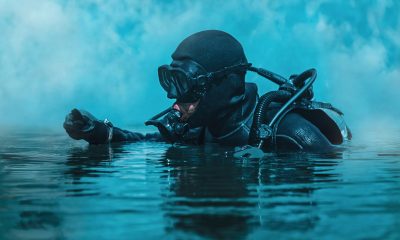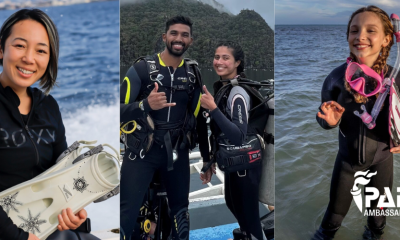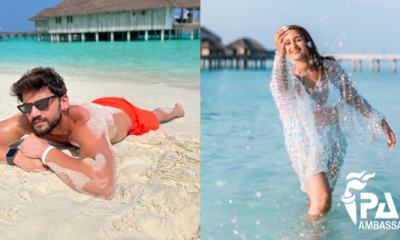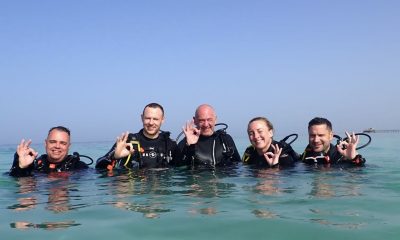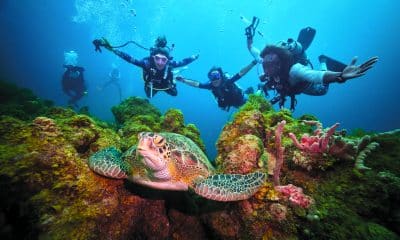News
Elevating Dive Safety Culture – The Supreme Importance of Vigilance and Sound Judgement
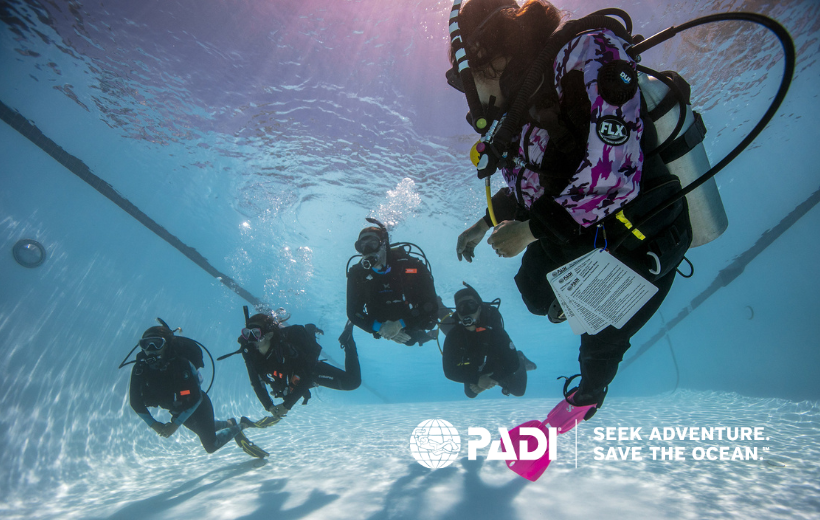
Diver training agency PADI® is reminding the diving industry that diver safety always comes first.
“Diver safety is each and every diving professional’s first and most important priority because when it’s lacking, preventable tragedies can occur,” says Drew Richardson, CEO and President of PADI Worldwide. “Dive incidents ripple well beyond the victims. They are deep, personal tragedies also impacting families, friends, and the entire global diving community – regardless of the diving organization individuals are associated with.”
“There is generally a reasonably low risk in diving when community, training course, and safe diving practices are followed, but when they are not, the severity of a potential accident will have serious consequences that could have been entirely avoidable,” continues Richardson. “While most diving Professionals put safety first, recent incidents where fatalities have occurred were not simple slips or forgetful moments. These tragedies resulted directly or indirectly from violating course standards, abandoning sound judgement and ignoring or overriding obvious and accepted dive community practices.”
To refresh the importance of diver safety being at the forefront of every business decision, course training or supervision, PADI shares the five safety points that must never be ignored.
1. Course Safety Standards and Community Safe Diving Practices
These are central to diver safety. Incident data repeatedly show that when someone deviates from these, the potential for an incident goes up. Analyses find violations cause or contribute to many diver fatalities. The lesson is obvious: follow all course standards and diving safe practices always, all the time, to the best of your ability. They work – and the data show it.
2. Safety Overlap is Not Superfluous
Safety procedures overlap and repeat, and this is intentional and necessary. No single safety procedure accounts for all variables – and those variables include inevitable human error – so multiple procedure “layers” are applied to close the gaps and help offset unintended simple mistakes or omissions. Incidents show that skipping seemingly repetitive procedures or disregarding seemingly “minor” standards removes a safety layer that in retrospect, would have prevented a tragedy.
3. Safety is Human
Safety standards and practices work when adapted to the local conditions and to the diver’s ability, but they don’t work by themselves – nor are they intended to. They rely on conservative good judgment and reasoned application. Doing this is primarily a matter of common sense and choosing the more conservative option should always be selected when in doubt. The basics of depths, ratios, equipment, or procedures are ones that even Open Water Diver students would know are mandatory, so misjudgment from a diving professional in these areas is inexcusable.
4. Safety Procedures are Dynamic
People, weather, diving conditions and circumstances vary. Technology, diving physiology knowledge and community practices change, so Standards and Procedures change with them. Stay updated. If someone finds themselves in a perplexing situation where following standards and procedures seems difficult or even impossible, chances are it’s not. In general, there’s no reason or excuse for violating established dive training Standards and Procedures.
5. Always be “On Duty” When it Comes to Safety
Diving has an impressive safety record but as a community we should always strive to continue to improve it. The actions of diving professionals must be visible and unmistakable, reflecting what is taught and following best practices without exception. A good example of this is predive safety checks, which sometimes get overlooked outside of training; yet incident data and anecdotal reports suggest that tight checks would prevent many incidents and close calls.
By conspicuously doing predive checks as professionals, the industry can encourage other divers to do the same. PADI is providing a free Download of a Predive Safety Check poster to display in prominent places such as boats, dive centers, classrooms or pool areas. Checklists are important safety reinforcers and used in aviation, surgical practice, technical diving and in diver instruction and guiding. They are a way to promote safe diving.
“When a dive instructor neglects standards, disregards required equipment or flouts established practices, they not only increase the likelihood of an unnecessary tragedy, but they can also be difficult or impossible to defend reasonably,” says Richardson.
“These actions can also void professional insurance warranties, leaving provided coverage for defense and liability in question at best. However, when you follow standards and procedures diligently to the best of your ability, you greatly reduce risk,” continues Richardson. “And should there be an incident, your actions can be compared to these standards to defend that they were proper, reasonable and appropriately applied to the local diving conditions for the divers under your supervision.”
You can download a Predive Safety Check poster from the PADI Pro Site under Course Related Documents, which is available in 14 languages. PADI Regional Training Consultants or Quality Management staff personnel around the planet are available to assist and consult where there may be questions.
Blogs
Northern Red Sea Reefs and Wrecks Trip Report, Part 3: The Mighty Thistlegorm
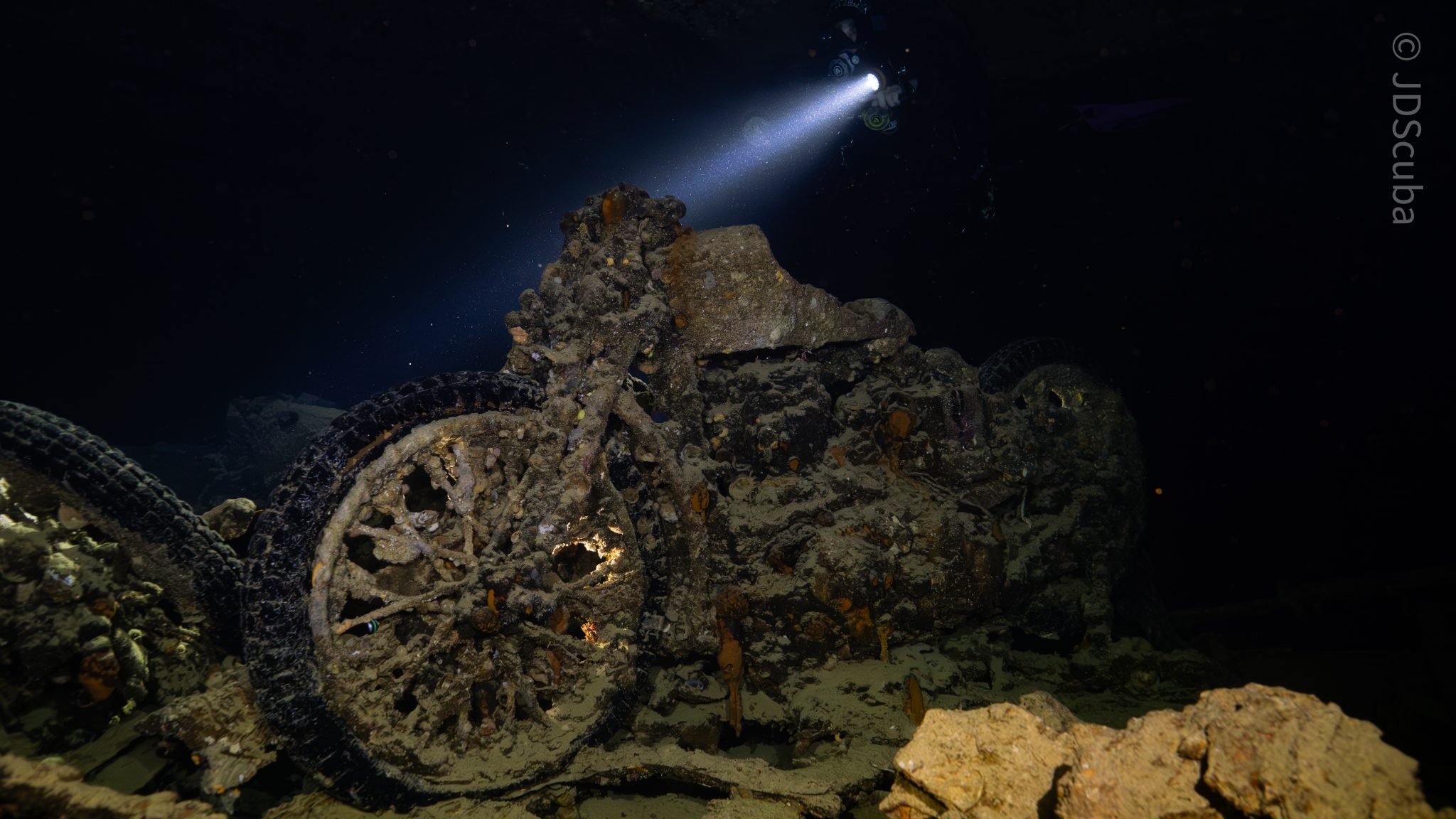
Jake Davies boards Ghazala Explorer for an unforgettable Red Sea diving experience…
Overnight, the wind picked up, making the planned morning dive a bit bumpy on the Zodiacs to the drop point on Thomas Reef. There, we would dive along the reef before descending through the canyon and then passing under the arch before ascending the wall with a gentle drift. The site provided great encounters with more pelagic species, including shoals of large barracuda, tuna, and bigeye trevally.
Once back on the boat, it was time to get everything tied down again as we would head back south. This time, with the wind behind us, heading to Ras Mohammed to dive Jackfish Alley for another great gentle drift wall dive before then heading up the coast towards the Gulf of Suez to moor up at the wreck of the Thistlegorm. This being the highlight wreck dive of the trip and for many onboard, including myself, it was the first time diving this iconic wreck. I had heard so much about the wreck from friends, and globally, this is a must on any diver’s list. Fortunately for us, there was only one other boat at the site, which was a rarity. A great briefing was delivered by Ahmed, who provided a detailed background about the wreck’s history along with all the required safety information as the currents and visibility at the site can be variable.
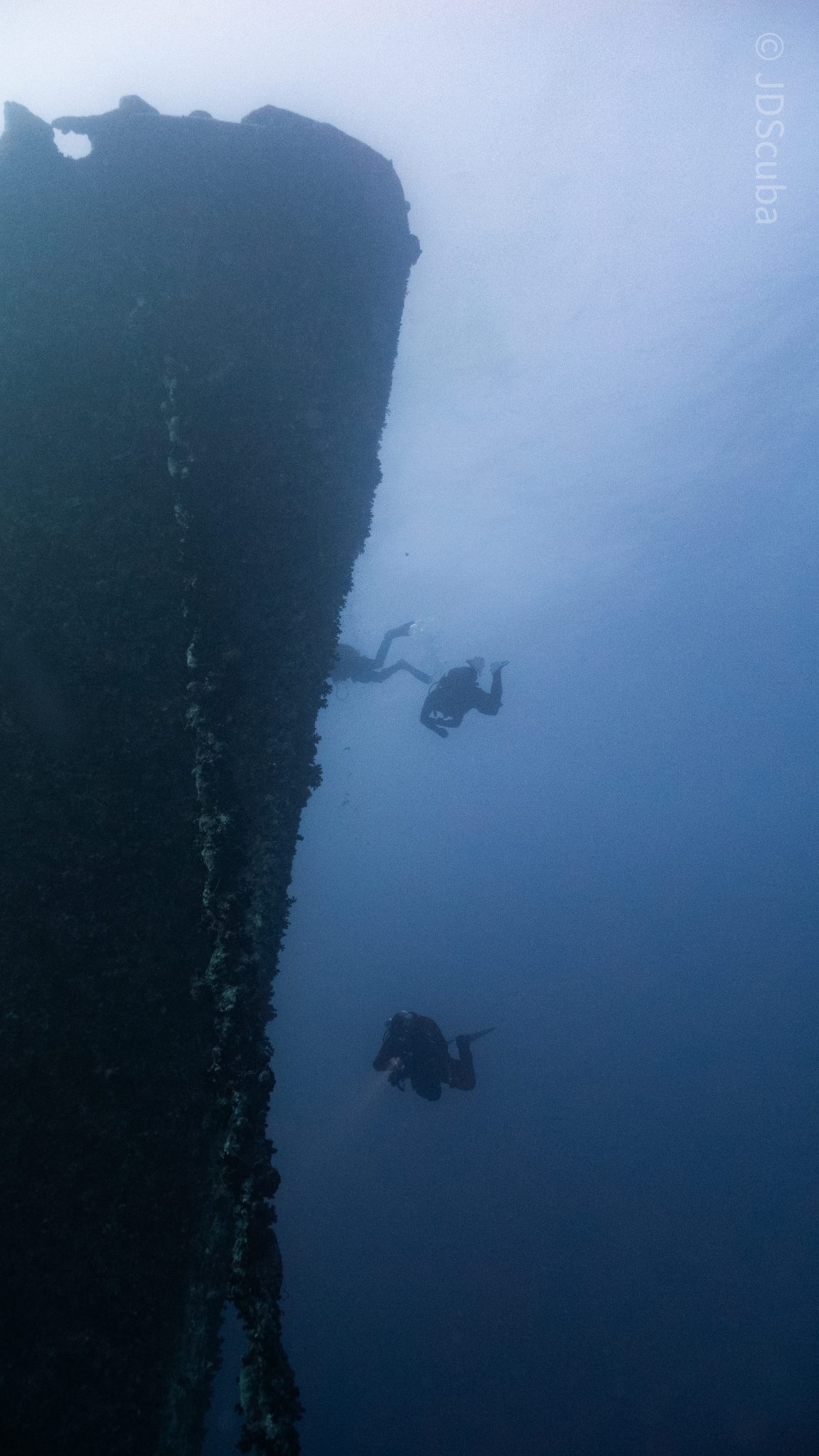
Kitting up, there was a lot of excitement on deck before entering the water and heading down the shoreline. Descending to the wreck, there was a light northerly current which reduced the visibility, making it feel more like the conditions that can be found off the Welsh coast. At 10m from the bottom, the outline of the wreck appeared as we reached the area of the wreck which had been bombed, as our mooring line was attached to part of the propeller shaft. Arriving on deck, instantly everywhere you looked there were many of the supplies which the ship was carrying, including Bren Carrier tanks and projectiles that instantly stood out.
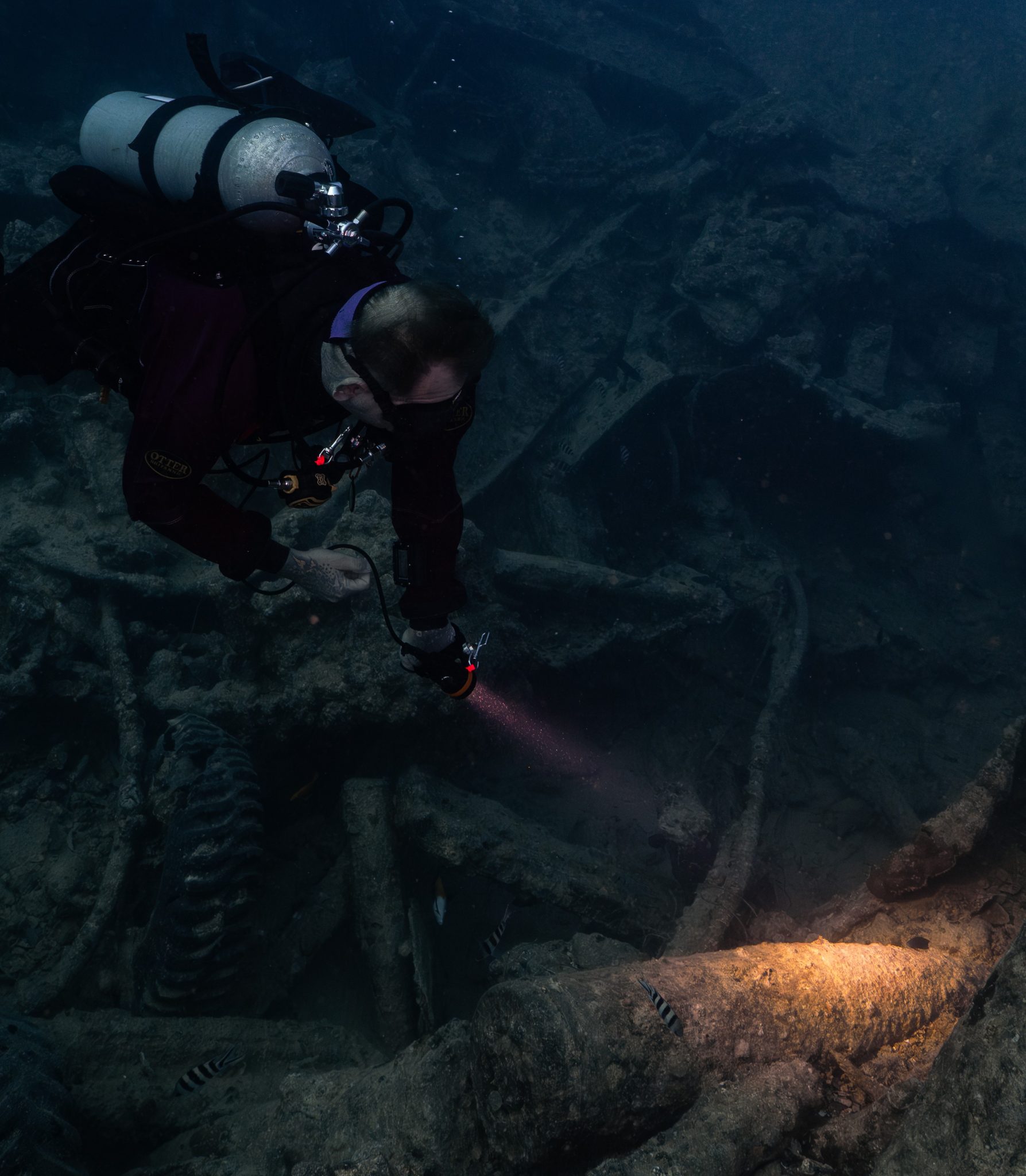
We headed around the exterior, taking a look at the large propeller and guns mounted on deck before entering the wreck on the port side to take a look in the holds. It was incredible to see all the trucks, Norton 16H, and BSA motorcycles still perfectly stacked within, providing a real snapshot in time.
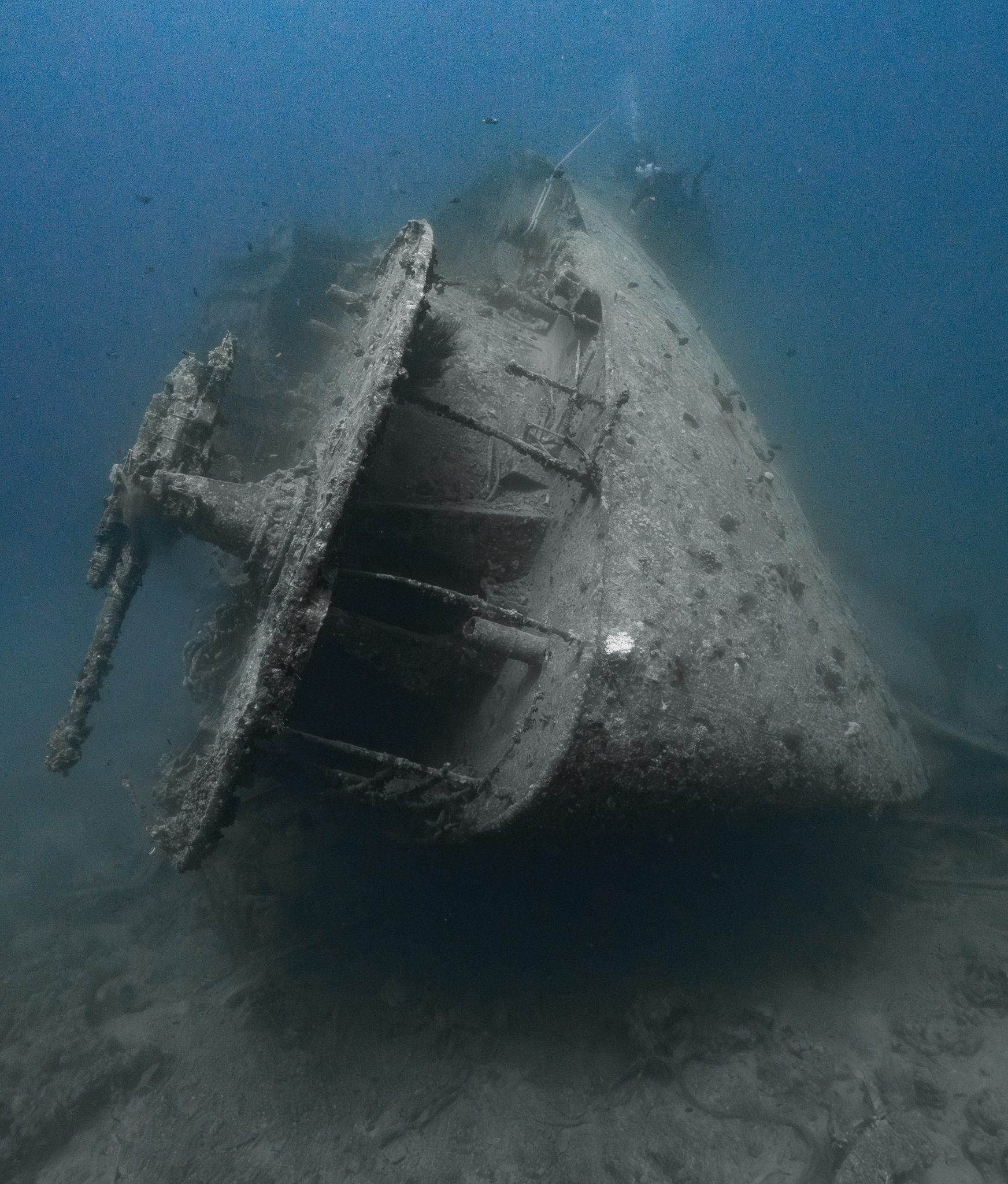
Overall, we had four dives on the Thistlegorm, where for all of the dives we were the only group in the water, and at times, there were just three of us on the whole wreck, which made it even more special, especially knowing that most days the wreck has hundreds of divers. Along with the history of the wreck, there was plenty of marine life on the wreck and around, from big green turtles to batfish, along with shoals of mackerel being hunted by trevally. Some unforgettable dives.
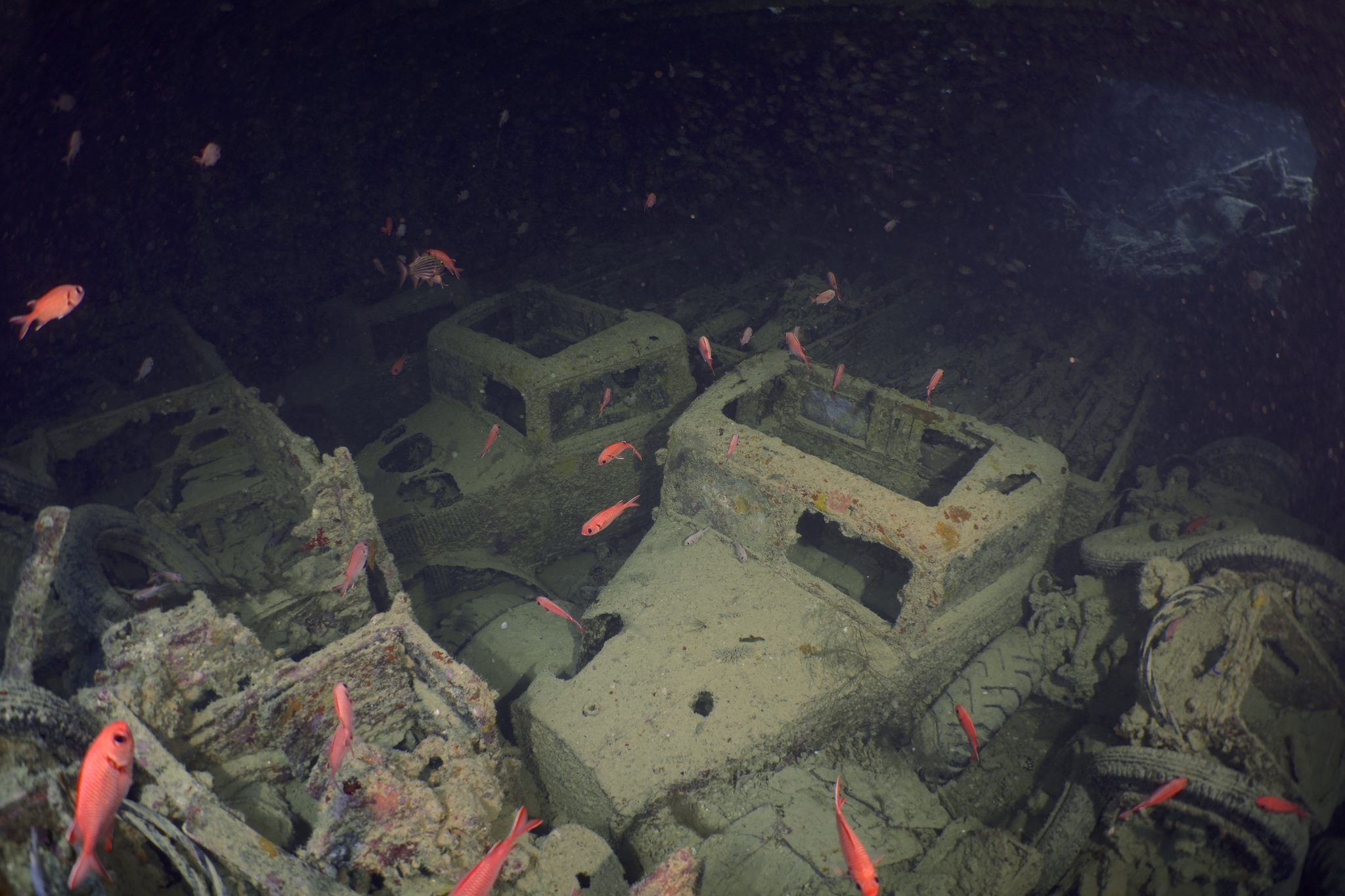
The final leg of the trip saw us cross back over the Suez Canal to the Gobal Islands where we planned to stay the night and do three dives at the Dolphin House for the potential of sharing the dive with dolphins. The site, which included a channel that was teeming with reef fish, especially large numbers of goatfish that swam in large shoals along the edge of the reef. These were nice relaxing dives to end the week. Unfortunately, the dolphins didn’t show up, which was okay as like all marine life they are difficult to predict and you can’t guarantee what’s going to be seen. With the last dive complete, we headed back to port for the final night where it was time to clean all the kit and pack before the departure flight the next day.
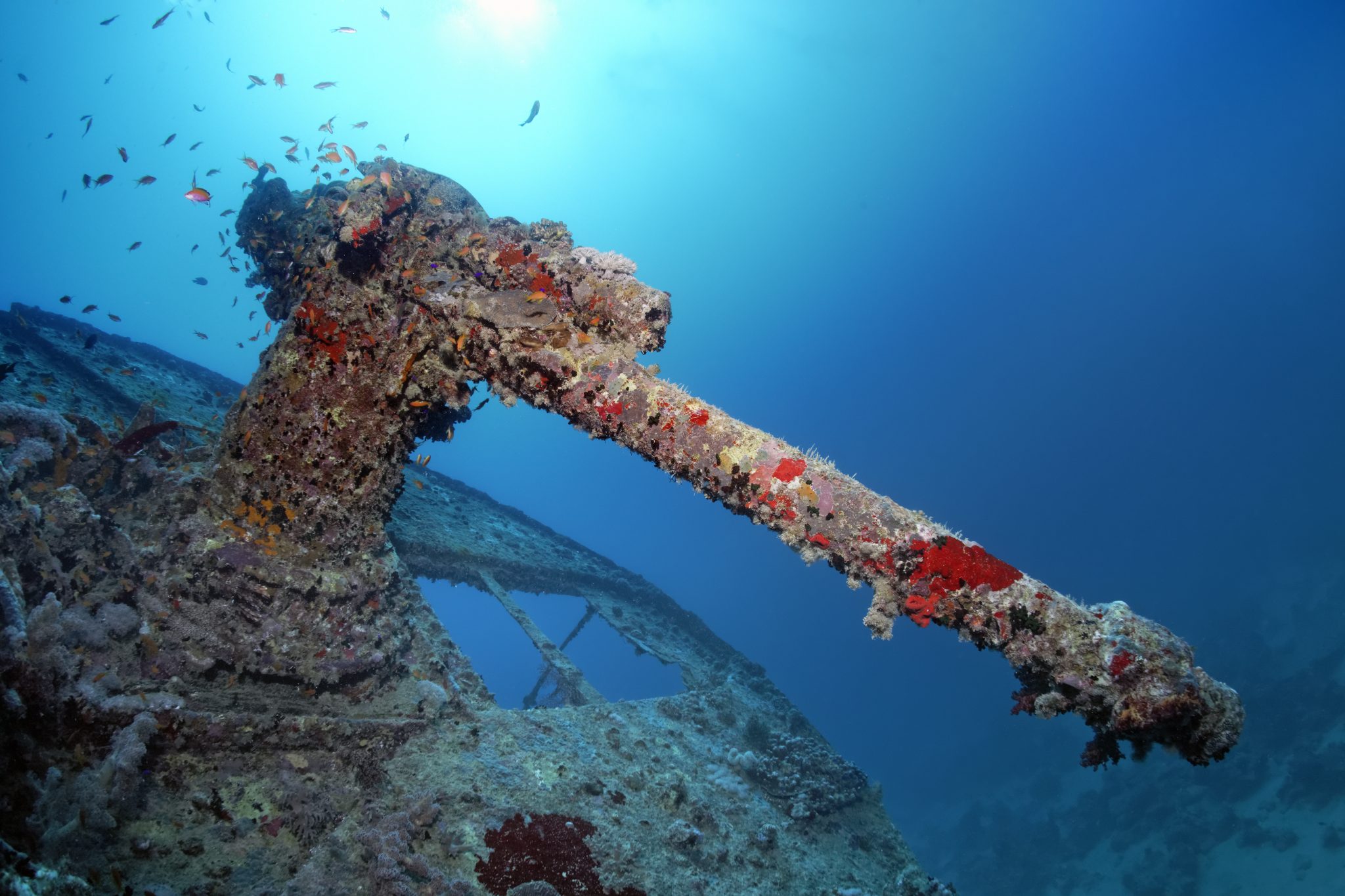
The whole week from start to finish on Ghazala Explorer was amazing; the boat had all the facilities you need for a comfortable week aboard. The crew were always there to help throughout the day and the chefs providing top quality food which was required after every dive. The itinerary providing some of the best diving with a nice mixture of wreck and reef dives. I would recommend the trip to anyone, whether it’s your first Red Sea liveaboard in the Red Sea or you’re revisiting. Hopefully, it’s not too long before I head back to explore more of the Red Sea onboard Ghazala Explorer.
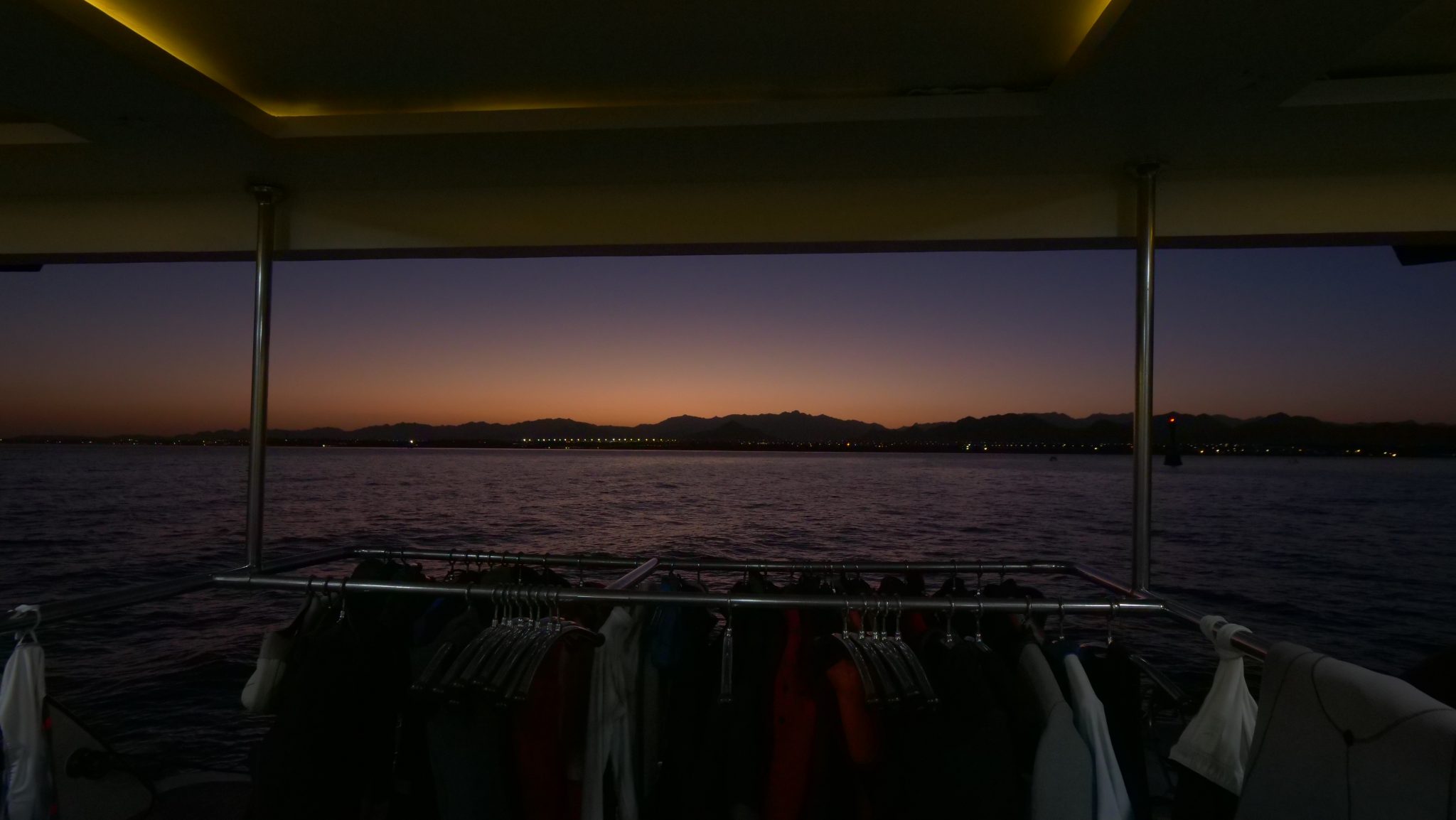
To find out more about the Northern Red Sea reef and wrecks itineraries aboard Ghazala Explorer, or to book, contact Scuba Travel now:
Email: dive@scubatravel.com
Tel: +44 (0)1483 411590
Photos: Jake Davies / Avalon.Red
Blogs
Northern Red Sea Reefs and Wrecks Trip Report, Part 2: Wall to Wall Wrecks
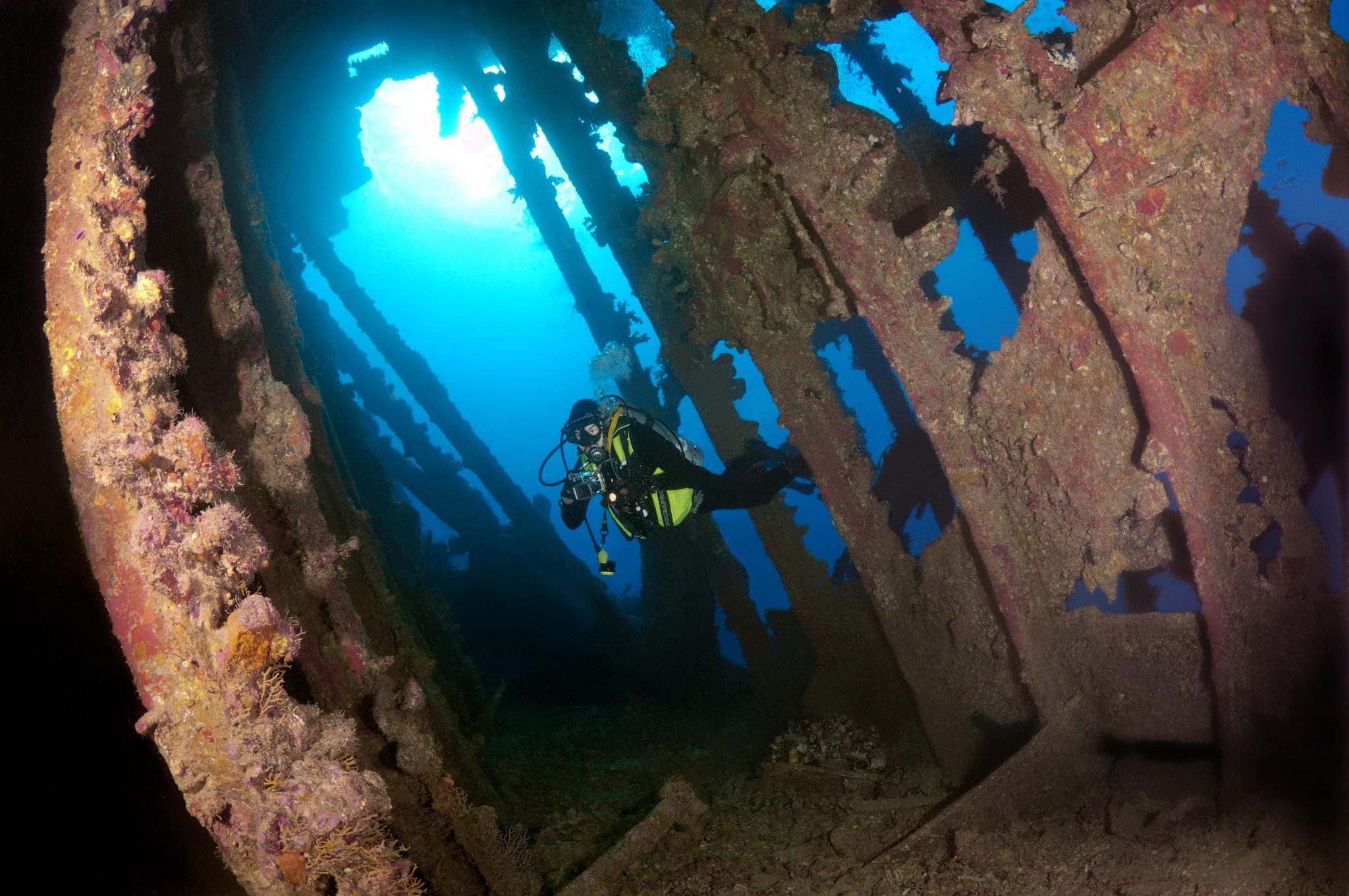
Jake Davies boards Ghazala Explorer for an unforgettable Red Sea diving experience…
The second day’s diving was a day full of wreck diving at Abu Nuhas, which included the Chrisoula K, Carnatic, and Ghiannis D. The first dive of the day was onto the Chrisoula K, also known as the wreck of tiles. The 98m vessel remains largely intact where she was loaded with tiles which can be seen throughout the hold. The stern sits at 26m and the bow just below the surface. One of the highlights of the wreck is heading inside and seeing the workroom where the machinery used for cutting the tiles are perfectly intact. The bow provided some relaxing scenery as the bright sunlight highlighted the colours of the soft coral reef and the many reef fish.
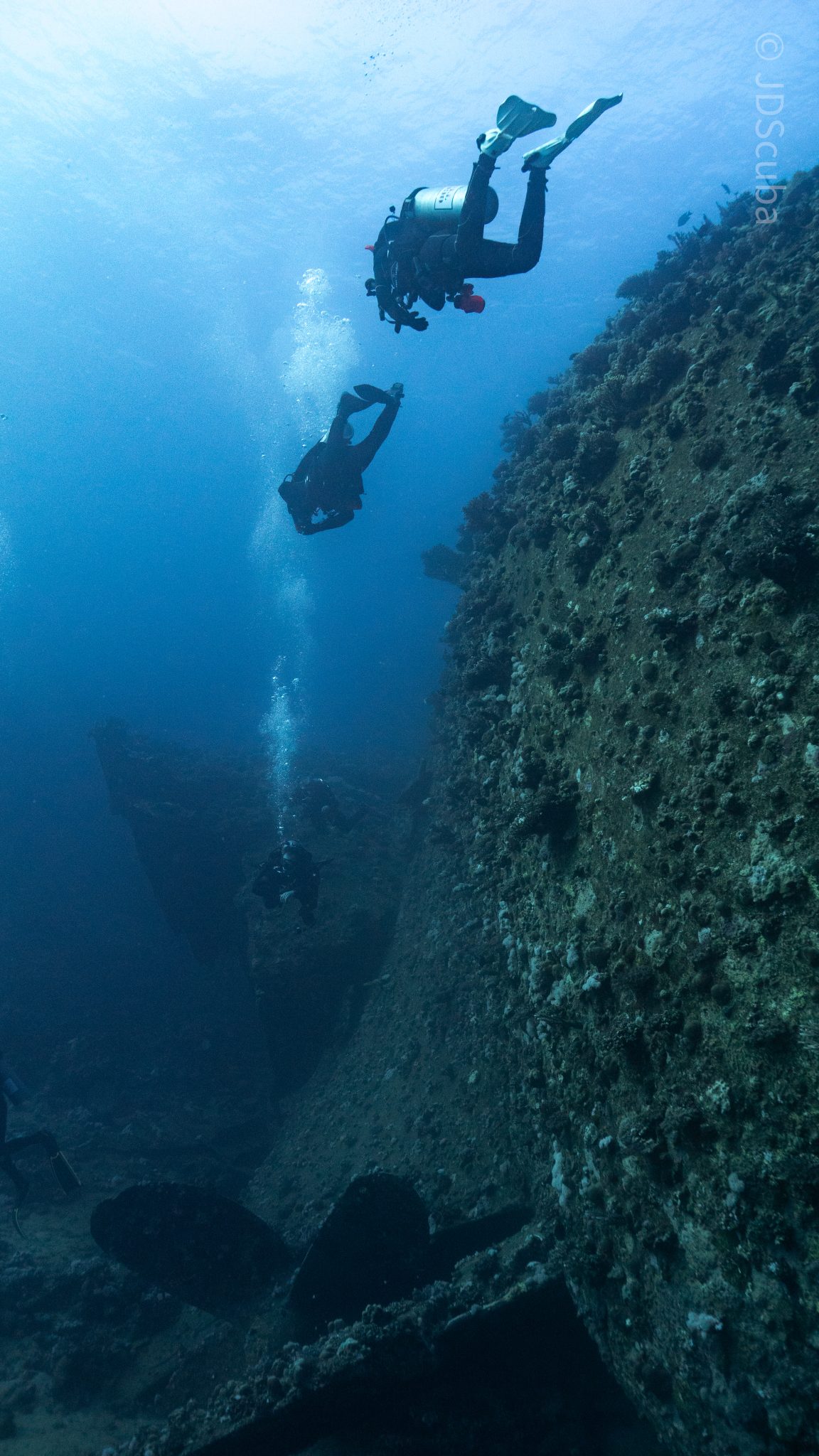
Following breakfast, we then headed to the next wreck, which was the Carnatic. The Carnatic is an 89.9m sail steamer vessel that was built in Britain back in 1862. She ran aground on the reef back in 1869 and remains at 27m. At the time, she was carrying a range of items, including 40,000 sterling in gold. An impressive wreck where much of the superstructure remains, and the two large masts lay on the seafloor. The wooden ribs of the hull provide structures for lots of soft corals, and into the stern section, the light beams through, bouncing off the large shoals of glass fish that can be found using the structure as shelter from the larger predators that are found outside of the wreck.
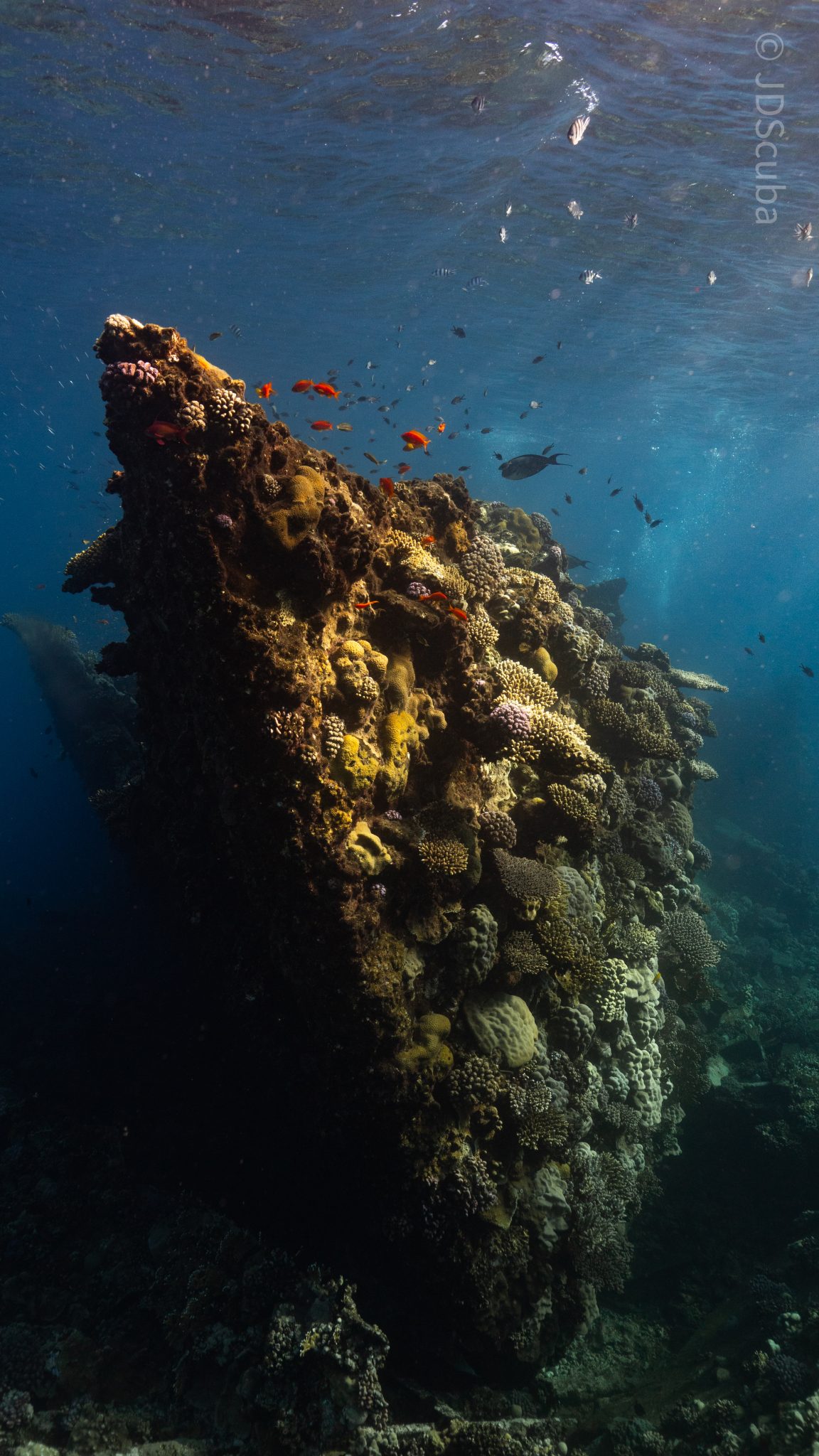
The final wreck at Abu Nuhas was the Ghiannis D, originally called ‘Shoyo Maru,’ which was 99.5m long and built in Japan back in 1969 before becoming a Greek-registered cargo ship in 1980. The ship then ran aground on the reef on April 19th, 1983, and now sits at the bottom at a depth of 27m. Heading down the line, the stern of the ship remains in good condition compared to the rest of the hull. The highlight of the wreck, though, is heading into the stern section and down the flights of stairs to enter the engine room, which remains in good condition and is definitely worth exploring. After exploring the interior section of the ship, we then headed over to see the rest of the superstructure, where it’s particularly interesting to see the large table corals that have grown at the bow relatively quickly considering the date the ship sank. After surfacing and enjoying some afternoon snacks, we made sure everything was strapped down and secured as we would be heading north and crossing the Gulf of Suez, where the winds were still creating plenty of chop.
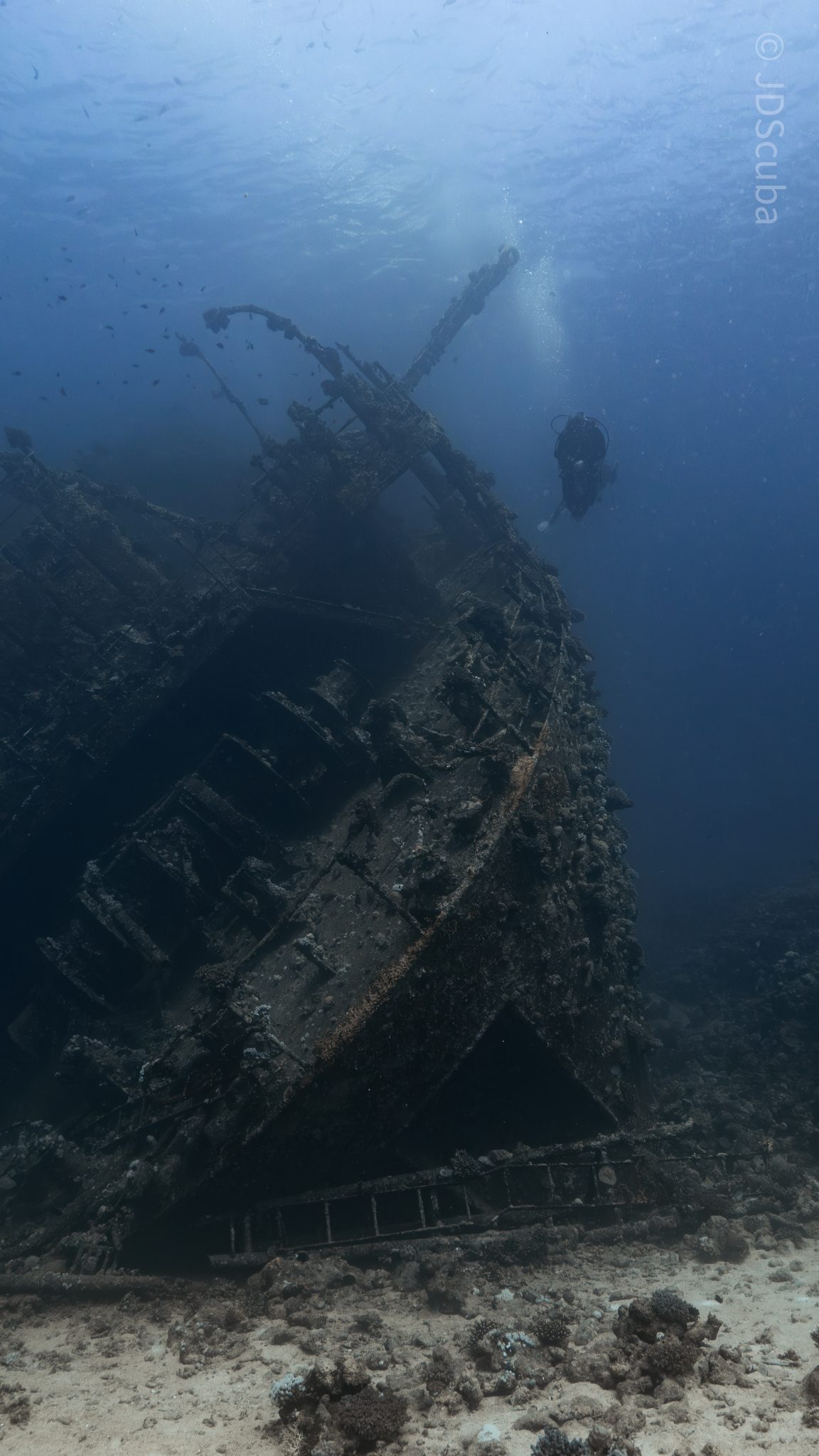
The next morning, it was a short hop to Ras Mohammed Nature Reserve for the next couple of days of diving. The 6am wake-up call came along with the briefing for the first site we would be diving, which was Shark & Yolanda. The low current conditions allowed us to start the dive at Anemone City, where we would drift along the steep, coral-filled wall. These dives involved drifts, as mooring in Ras Mohammed wasn’t allowed to protect the reefs. As a dive site, Shark & Yolanda is well-known and historically had a lot of sharks, but unfortunately not so many in recent years, especially not so early in the season. However, there was always a chance when looking out into the blue.
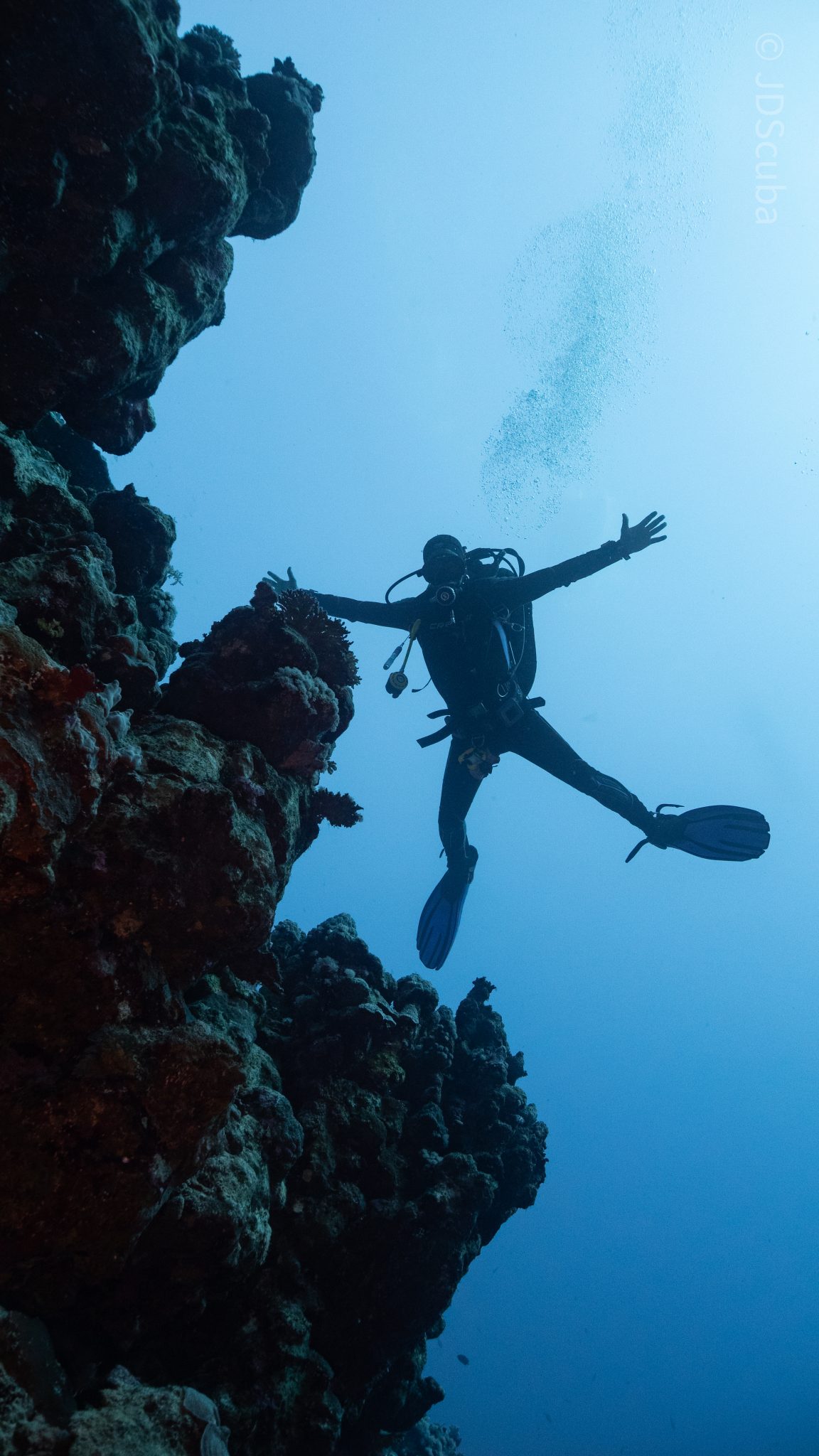
The gentle drift took us along the steep walls of the site, with plenty of anemone fish to be seen and a huge variety of corals. It wasn’t long into the dive before we were accompanied by a hawksbill turtle, who drifted with us between the two atolls before parting ways. Between the two reefs, the shallow patch with parts of coral heads surrounded by sand provided the chance to see a few blue-spotted stingrays that were mainly resting underneath the corals and are always a pleasure to see. With this being the morning dive, the early sunlight lit up the walls, providing tranquil moments. Looking out into the blue, there was very little to be seen, but a small shoal of batfish shimmering underneath the sunlight was a moment to capture as we watched them swim by as they watched us.
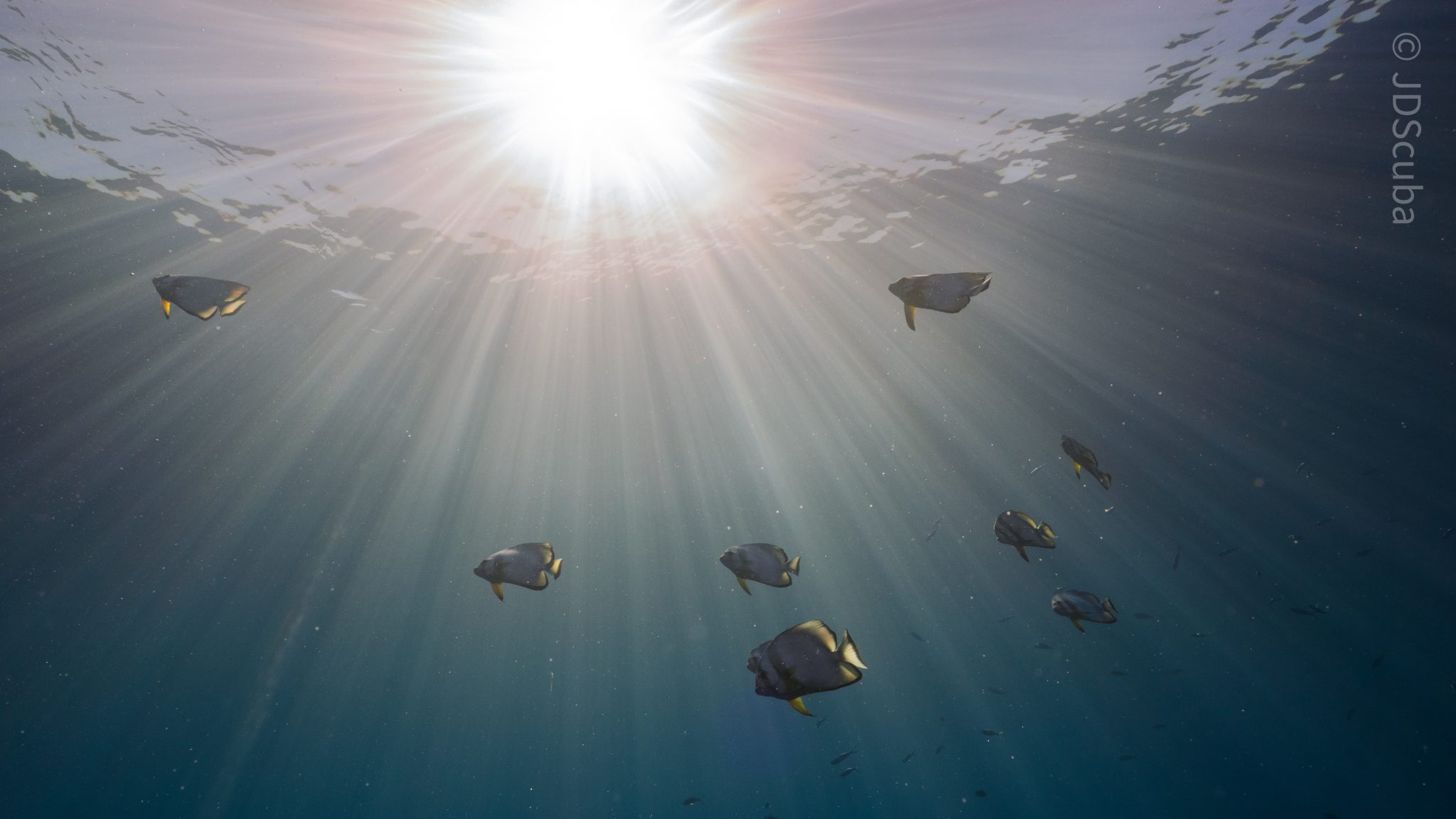
Towards the end of the dive, we stopped at the wreck of the Jolanda where the seafloor was scattered with toilets from the containers it was carrying. This provided a unique site to make a safety stop, which was also accompanied by a large barracuda slowly swimming by, along with a hawksbill turtle calmly swimming over the reef as the sun rays danced in the distance.
For the next dive, we headed north to the Strait of Tiran to explore the reefs situated between Tiran Island and Sharm El Sheik, which were named after the British divers who had found them. We started on Jackson before heading to Gordons Reef, where we also did the night dive. All the atolls at these sites provided stunning, bustling coral reefs close to the surface and steep walls to swim along, which always provided the opportunity to keep an eye out for some of the larger species that can be seen in the blue. Midwater around Jackson Reef was filled with red-toothed triggerfish and shoals of banner fish, which at times were so dense that you couldn’t see into the blue. Moments went by peacefully as we enjoyed the slow drift above the reef, watching these shoals swim around under the mid-afternoon sun.
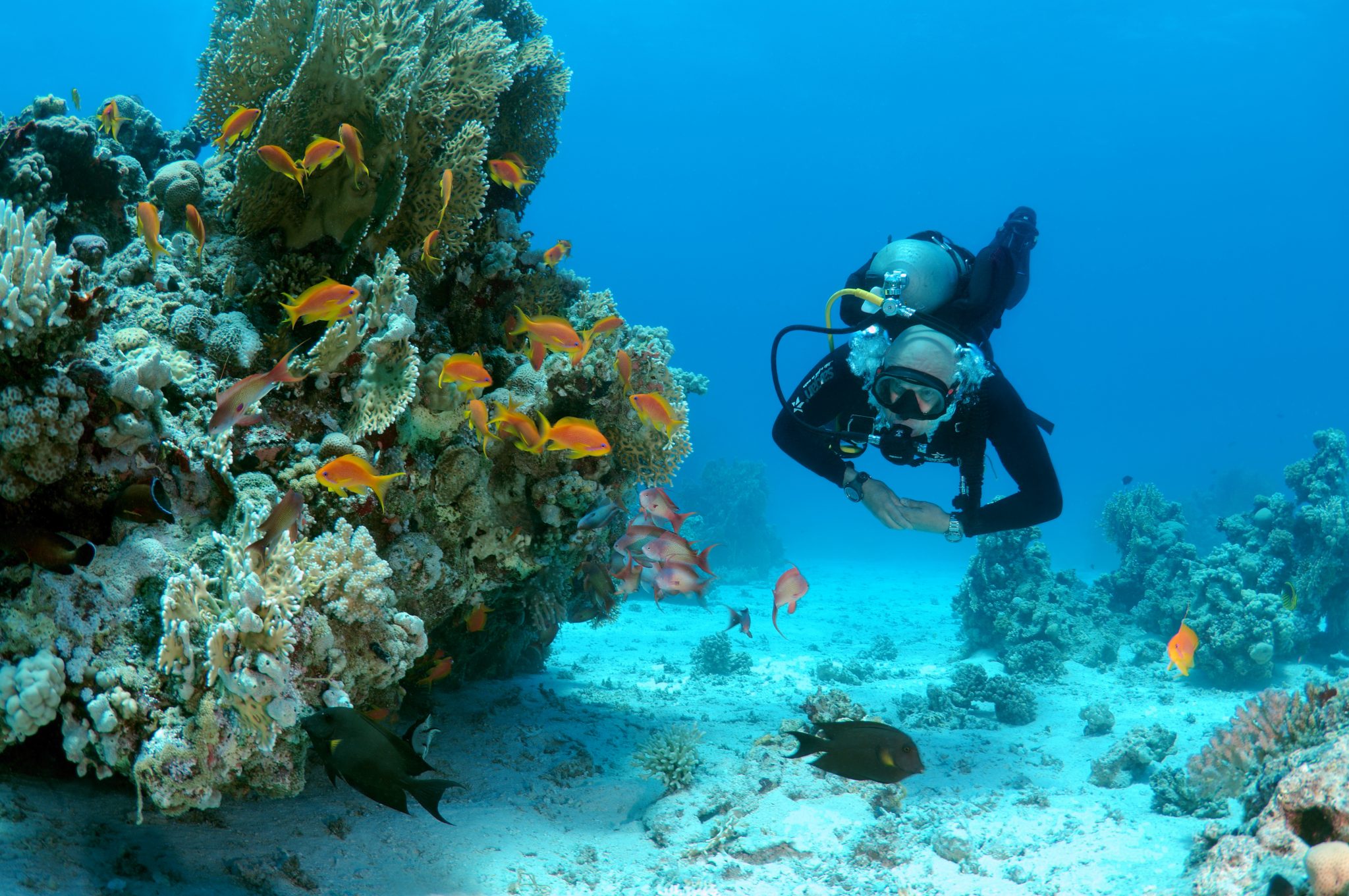
The night dive at Gordon’s Reef was mainly among the stacks of corals surrounded by sand, which was great to explore under the darkness. After some time circling the corals, we came across what we were really hoping to find, and that was an octopus hunting on the reef. We spent the majority of the dive just watching it crawl among the reef, blending into its changing surroundings through changes in colour and skin texture. It’s always so fascinating and captivating to watch these incredibly intelligent animals, in awe of their ability to carry out these physical changes to perfectly blend into the reef. Before we knew it, it was time to head back to the boat to enjoy a well-deserved tasty dinner prepared by the talented chefs onboard.
Check in for the 3rd and final part of this series from Jake tomorrow!
To find out more about the Northern Red Sea reef and wrecks itineraries aboard Ghazala Explorer, or to book, contact Scuba Travel now:
Email: dive@scubatravel.com
Tel: +44 (0)1483 411590
Photos: Jake Davies / Avalon.Red
-

 News3 months ago
News3 months agoHone your underwater photography skills with Alphamarine Photography at Red Sea Diving Safari in March
-

 News3 months ago
News3 months agoCapturing Critters in Lembeh Underwater Photography Workshop 2024: Event Roundup
-

 Marine Life & Conservation Blogs2 months ago
Marine Life & Conservation Blogs2 months agoCreature Feature: Swell Sharks
-

 Blogs2 months ago
Blogs2 months agoMurex Resorts: Passport to Paradise!
-

 Blogs2 months ago
Blogs2 months agoDiver Discovering Whale Skeletons Beneath Ice Judged World’s Best Underwater Photograph
-

 Gear Reviews3 months ago
Gear Reviews3 months agoGear Review: Oceanic+ Dive Housing for iPhone
-

 Marine Life & Conservation2 months ago
Marine Life & Conservation2 months agoSave the Manatee Club launches brand new webcams at Silver Springs State Park, Florida
-

 News3 months ago
News3 months agoWorld’s Best Underwater Photographers Unveil Breathtaking Images at World Shootout 2023




